|
Dolce far niente
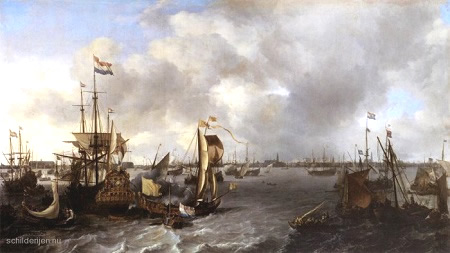
Gezicht op Amsterdam met schepen op het IJ door Ludolf Backhuysen, 1666
En ‘s avonds namen we de pont
En ‘s avonds namen we de pont
over het IJ en keken naar
de sterren in het water
naar de schepen in de nacht
met hun kajuit van licht waar
gezongen werd misschien een psalm
we voeren heen en weer van onze
naar de overkant waar wij
niet wilden zijn het IJ gleed
ons voorbij een schip gelijk
maar als van donker glas met
huiverende rimpelingen
zou het vanzelf weer ochtend
worden en waren wij erbij
voor een morgen aan het IJ

Guus Luijters (Amsterdam, 3 november 1943)
Het IJ tijdens Sail 2010
De Nederlandse schrijver en cabaretier Kees van Kooten werd geboren op 10 augustus 1941 in Den Haag. Zie ook mijn blog van 10 augustus 2010 en eveneens alle tags voor Kees van Kooten op dit blog.
Uit: Dagboek van een werkloze optimist (Het groot bescheurboek)
“Maandag
Fantastisch geslapen. Wat was het weer een gezellig weekend. Wat kan Lea's vader toch kostelijk vertellen. Vooral als hij begint over dat trappetje, vroeger op de zaak. Kan ik honderd keer horen.
En wat ziet Lea's moeder er toch fantastisch uit, voor haar leeftijd. Als Lea er later ook zo uit gaat zien...nou, ik teken er voor.
Nee, ik mag mijn handen dichtknijpen met zulke schoonouders. Trouwens ook met de buren en helemaal de hele straat. Leuk gelukt is dat met die bloembakken. Het lijkt soms wel of ons straatje bewoond wordt door alleen maar leuke mensen met een meer dan gemiddelde fantasie: als je alleen al al die verschillende huisnummers ziet!
Mijn nieuwe sokken zitten precies goed. Blij dat ik die kleur heb genomen.
Lea vindt ze ook het einde. Na de douche (zalig!), heerlijke koffie (Goudmerk) gedronken en onze kopjes niet afgewassen, maar gewoon de boel de boel gelaten.
Ergens zijn we wel artiesten.
Handig dat het ochtendblad in twee delen komt, dan kunnen Lea en ik na verloop van tijd oversteken. Tegen twaalven zalig gewandeld met de hond en op de terugweg twee warme lekkerbekjes gehaald bij die romantische viskar op de Macayweg.
Gelukkig niet in poep getrapt, zodat ze thuis nog warm waren. 's Middags eindelijk heerlijk oude kranten gelezen. BrWrr! Blij dat het niet het nieuws van vandaag was. Half uurtje geknutseld (Taj Mahal uit kroonkurken).
Zo lekker als Lea vandaag de bloemkool had gemaakt (kaassausje!), proefde ik haar nog nooit.
's Avonds samen stiekem meegekwist met de televisie. Samen bed verschoond, waar vervolgens als blokken in geslapen.”
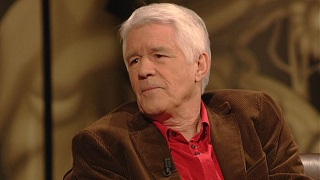
Kees van Kooten (Den Haag, 10 augustus 1941)
De Duitse schrijver Alfred Döblin werd op 10 augustus 1878 geboren in Stettin. Zie ook alle tags voor Alfred Döblin op dit blog en ook mijn blog van 10 augustus 2010
Uit: Berlin Alexanderplatz
„Und leise fing er wieder seine Musik an, das Grunzen und Brummen, und ich geh nich wieder auf die Straße.
Der rote Jude trat wieder in das Haus, entdeckte den andern am Geländer zuerst nicht. Er hörte ihn summen. «Nun sagt, was macht Ihr hier? Ist Euch nicht gut?» Er machte sich vom Pfosten los, ging nach dem Hof zu. Wie er den Torflügel anfaßte, sah er, es war der Jude von dem andern Haus. « Gehn Sie doch los! Was wolln Sie denn von einem?» «Nun nun., nichts. Ihr ächzt und stöhnt so, wird man doch fragen können, wie Euch ist.» Und durch den Türspalt drüben schon wieder die ollen Häuser, die wimmelnden Menschen, die rutschenden Dächer. Der Strafentlassene zog die Hoftür auf, der Jude hinter ihm: «Nun nun, was soll geschehn, wird doch nicht so schlimm sein. Man wird schon nicht verkommen. Berlin ist groß. Wo tausend leben, wird noch einer leben.»
Ein hoher finsterer Hof war da. Neben dem Müllkasten stand er. Und plötzlich sang er schallend los, sang die Wände an. Den Hut nahm er vom Kopf wie ein Leierkastenmann. Von den Wän den kam der Ton wieder. Das war gut. Seine Stimme erfüllte seine Ohren. Er sang mit so lauter Stimme, wie er im Gefängnis nie hätte singen dürfen. Und was er sang, daß es von den Wänden widertönte? «Es braust ein Ruf wie Donnerhall.» Kriegerisch fest und markig. Und dann: «Juvivallerallera» mitten aus einem Lied. Es beachtete ihn keiner. Der Jude nahm ihn am Tor in Empfang: «Ihr habt schön gesungen.
Ihr habt wirklich schön gesungen. Ihr könntet Gold mit einer Stimme verdienen, wie Ihr habt.» Der Jude folgte ihm auf der Straße, nahm ihn beim Arm, zog ihn unter unendlichem Gespräch weiter, bis sie in die Gormannstraße einbogen, der Jude und der starkknochige, große Kerl im Sommermantel, der den Mund zusammenpreßte, als wenn er Galle spucken müßte.“
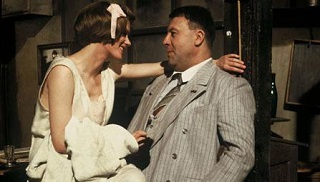
Alfred Döblin (10 augustus 1878 – 26 juni 1957)
Barbara Sukowa (Mieze) en Günter Lamprecht (Franz Biberkopf) in de tv-serie van Rainer Werner Fassbinder uit 1980
De Oegandese schrijver Moses Isegawa (pseudoniem van Sey Wava) werd geboren op 10 augustus 1963 in Kawempe in Oeganda. Zie ook alle tags voor MosesIsegawa op dit blog en ook mijn blog van 10 augustus 2010.
Uit: Abyssinian Chronicles
“Uncle Kawayida was a meter reader for the Ugandan National Energy Board. His job was to visit people’s homes and take readings used to calculate the monthly energy bills customers had to pay. Courtesy of his travels and, I believe, of his large imagination, he told stories of women who used sugared promises to try to bribe him into under-reading their meters, and of men who tried to impede his work by accusing him of flirting with their wives. He amazed us with stories of people living in congested urban squalor, ten to a little house, with parents fucking in the vicinity of children who cleverly feigned sleep. He spoke of women who committed garage abortions by slipping stiff leaf stalks or bike spokes up the condemned birth canals of unfaithful wives or sneaky daughters, an occasional fatal or near-fatal hemorrhage the price for puncturing the wrong things. He told tales of men who beat their wives with electric cables, sticks, boots or fists and afterward ordered them to serve their dinner or to fuck them, and of women who drank and fought like men, cracked open men’s heads with beer bottles and subsequently emptied their pockets. In those places were wild children who did not go to school and got into a life of crime: stealing, robbing, mugging, sometimes even killing people. In the same places lived rich people’s children who went to school in big cars, laughed at teachers and wrote love letters in class. There were also people who could hardly make ends meet, who ate one meager meal a day after doing backbreaking work. In that world roamed fantastic football hooligans who fought their rivals in epic battles in which rocks, piss bottles, shit parcels, clubs and even bullets were exchanged to the point where police had to intervene with tear gas or bullets. There were men and women, devout churchgoing Catholics and Protestants, who worshipped the Devil and offered blood sacrifices during nocturnal orgies; and people of different religious denominations who deposited featherless, headless hens, dead lizards, frog entrails and other ritual garbage in other people’s yards, outside shopfronts or at road junctions.”
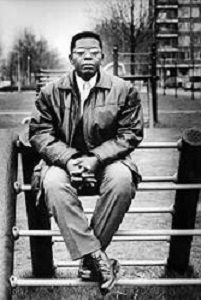
Moses Isegawa (Kawempe, 10 augustus 1963)
De Amerikaanse dichter en schrijver Mark Doty werd geboren op 10 augustus 1953 in Maryville, Tennessee. Zie ook alle tags voor Mark Doty op dit blog en ook mijn blog van 10 augustus 2010.
Long Point Light
Long Pont's apparitional
this warm spring morning,
the strand a blur of sandy light,
and the square white
of the lighthouse-separated from us
by the bay's ultramarine
as if it were nowhere
we could ever go-gleams
like a tower's ghost, hazing
into the rinsed blue of March,
our last outpost in the huge
indetermination of sea.
It seems cheerful enough,
in the strengthening sunlight,
fixed point accompanying our walk
along the shore. Sometimes I think
it's the where-we-will be,
only not yet, like some visible outcropping
of the afterlife. In the dark
its deeper invitations emerge:
green witness at night's end,
flickering margin of horizon,
marker of safety and limit.
but limitless, the way it calls us,
and where it seems to want us
to come, And so I invite it
into the poem, to speak,
and the lighthouse says:
Here is the world you asked for,
gorgeous and opportune,
here is nine o'clock, harbor-wide,
and a glinting code: promise and warning.
The morning's the size of heaven.
What will you do with it?

Mark Doty (Maryville, 10 augustus 1953)
De Poolse schrijver Jerzy Pilch werd geboren op 10 augustus 1952 in Wisla. Zie ook alle tags voor Jerzy Pilch op dit blog en ook mijn blog van 10 augustus 2010.
Uit: His Current Woman (Vertaald door Bill Johnston)
“Come here,” he said with that particular sort of tenderness which human fury can sometimes turn into in the space of a few seconds.The specter standing at the foot of the bed vanished, but the tenderness remained.
Dear Lord, thought Kohoutek, dear Lord, it’s not that I’m taking Your name in vain, but when all’s said and done, my current woman is sleeping in the attic of a prewar slaughterhouse, separated from outer space by no more than a layer of crumbling roof tiles and a piece of cardboard. I mean, it’s ridiculous.
At this point, in Pawel Kohoutek’s soul and body deadly fear gave way to stupendous audacity. Since I was capable of concealing her; since I was able to take her bread, sausage, lemonade, and three blankets from the stove room; since I managed to accomplish all that, I’ll accomplish even more: Unnoticed by anyone, I will go to her and I will make love to her, said Kohoutek almost aloud, and he rose from his bed. Incidentally, his thoughts continued, what is it that she sees in me? She’s just like all the others; she’s attracted by that damned veterinary medicine, he answered himself. In the silence and the darkness he set about getting dressed. He put on pants and a sweater, pulled his shoes on his bare feet, threw his trench coat around his shoulders, and moved off with extreme caution down the long hallway toward the front door.As he was passing the room in which his wife slept, he paused for a moment to assure himself he was safe. He placed an ear to her door and listened to her peaceful breathing. The poor thing’s asleep, he thought, and he was suddenly overcome by another wave of emotion.This time it was an emotion connected strictly with the matter of marital fidelity.
The poor thing, she’s sleeping peacefully, and I’m up to all this.
I mean, I’ve been with this woman for so many years, whispered Kohoutek to himself, so many years, and what I’m doing is so immoral. And upon a sudden impulse Kohoutek opened the door and, still dressed in his clothes, climbed onto her bed and began to shower her with passionate kisses. Kohoutek’s wife, who was in a deep sleep, didn’t immediately realize what was going on.”
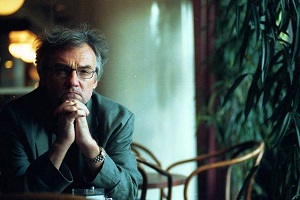
Jerzy Pilch (Wisla, 10 augustus 1952)
Zie voor nog meer schrijvers van de 10e augustus ook mijn blog van 10 augustus 2014 deel 2 en eveneens deel 3.
|



